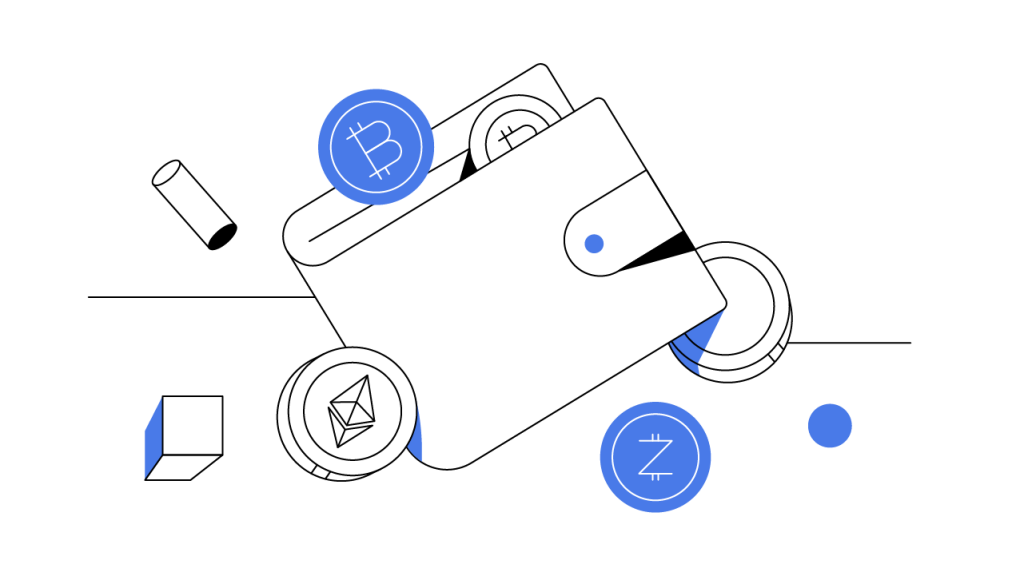Contents
Crypto Wallets for Beginners: What You Need to Know
Once you’ve purchased cryptocurrency, you need to decide how you want to store it. Here, we break down crypto wallets.
Updated June 28, 2022 • 4 min read

Summary
Owning cryptocurrency requires using a crypto wallet to store your funds. There are many different types of crypto wallets. A crypto wallet can be hosted online, or it can be software downloaded on your phone or computer or a specialized piece of hardware, among other options. Regardless of the crypto wallet type, they all store public and private keys which control the associated crypto and allow you to send and receive cryptocurrency. Transactions are then completed on the blockchain using the keys held in your wallet.
Understanding Crypto Wallets
There is no perfect crypto wallet, each different type of crypto wallet has pros and cons. Some have better security, while others are easier to use, and some are more mobile. Certain crypto wallets require more personal responsibility, while others require you to trust a third party to keep your assets safe. Key choices you’ll make with regard to what crypto wallet you end up using include deciding on a:
Custodial or non-custodial wallet
Online, mobile, desktop, or hardware wallet
Hot or cold wallet
Hot Wallet, Cold Wallet, or Both?
A hot wallet is always, or almost always, connected to the internet. Because you need to be connected to the internet to transact, this is the most convenient type of crypto wallet. A hot wallet can be web-based or it could be an application downloaded on your phone or computer. Your crypto exchange wallet, where the cryptocurrency you purchased on an exchange will end up, is one example of a hot wallet. The downside of hot wallets is that their constant internet connection makes them more vulnerable to hacking than cold wallets.
A cold wallet, on the other hand, is a wallet that is almost always disconnected from the internet, making it extraordinarily hard to hack. Typically, cold wallets come in the form of a crypto hardware wallet — a specialized device that is plugged into your USB port or accessible via bluetooth. This is considered the most secure type of crypto wallet, but lacks the convenience of a hot wallet that would allow you to trade and transfer your cryptocurrency funds quickly.
While a crypto hardware wallet must be connected via personal computer to the internet to make a transaction and interact with the blockchain, the “signing” of the transaction itself happens “in-device,” meaning when your private keys are used to sign a transaction they remain on your device away from potential bad actors. A crypto hardware wallet will therefore still be considered a cold wallet even while in use. Most of the time this device is offline and is generally used for long-term storage of large amounts of crypto. Paper wallets are also cold wallets, but they are no longer widely recommended as a way to store your keys.
Custodial vs. Non-Custodial Wallets
The private keys in a crypto wallet control the funds in that wallet by assigning ownership to the holder of the keys. A non-custodial crypto wallet enables you to control the keys yourself, rather than delegating the job of securing the keys to a third party, like an exchange. This is considered more secure but requires you to take more responsibility. If you were to lose your wallet or forget your password, you could lose your funds if you don’t have a recovery phrase.
If the keys in your crypto wallet are controlled by someone else, it’s considered a “custodial” wallet. These crypto wallets are typically exchange or web-based wallets that you can access through your phone or desktop. You must trust the custodian of your keys the same way you’d trust a vault to hold your valuables, and it is therefore important to choose a reputable crypto custodian.
Despite the lower level of security, some prefer custodial crypto wallets since they don’t require as much personal responsibility and are more convenient, allowing you to trade and transact more seamlessly. If you forget your exchange password, it’s usually a straightforward process to reset it, whereas if you forget a non-custodial crypto wallet password there may be no way to recover your funds.
Different Types of Crypto Wallets
Web-based wallets are accessed via your browser, and as there’s nothing to download, you can access this crypto wallet from any phone or computer. These are considered the least secure types of crypto wallets given their continuous connectivity to the internet. Although most were initially custodial, several web wallets are now non-custodial giving you sole control of your keys, which is widely considered an improvement.
Mobile and desktop wallets are based on software that is downloaded to your phone or computer, and they are more secure than web-hosted wallets. Most mobile and desktop wallets are non-custodial, and some are available for both Android and iOS devices, or only work with a specific operating system. Likewise, some desktop wallets are available for Linux, Mac, and Windows, while others are only offered on one operating system. And lastly, some crypto wallets have both a mobile and desktop version.
Crypto hardware wallets are specialized devices that are offline when not transacting and usually look like a thumb-drive. When transacting, crypto hardware wallets are connected to the internet via the USB port or bluetooth connection to a personal computer, and the “signing” of the cryptocurrency transaction is done “in-device,” making it impossible to hack remotely. These types of crypto wallets are the most secure but also the least convenient. They are often known as cold wallets given that they usually remain disconnected from the internet. In addition, these crypto wallets typically cost between $50 and $200, whereas most other wallets are free. Crypto hardware wallets are recommended for those expecting to hold large amounts of cryptocurrency long term.
Wallet Security Best Practices
Whichever crypto wallets you choose, it’s recommended you ensure that you have passwords for the wallets themselves as well as for the devices they are stored on. For all non-custodial crypto wallets, you should keep a recovery phrase that will backup your wallet and allow you to regenerate the associated private keys on a new wallet should you misplace the original device. Be sure to store this phrase in a safe place; anyone with access to it may also access the associated funds.
Keeping up to date antivirus software and using a virtual private network (VPN) is also recommended. For an exchange wallet, it’s recommended you follow the exchange’s security recommendations, which usually includes two-factor authentication (2FA) such as Google Authenticator or an SMS password.
Choose the Best Crypto Wallet For Your Needs
Choosing which wallets to use, like choosing which cryptos to buy, doesn’t have a one-size-fits-all answer. Most crypto enthusiasts use a combination of wallets: an exchange wallet, a mobile wallet, and a hardware wallet. Your exchange wallet is used to buy, trade, and sell. Your mobile wallet contains a smaller amount for making purchases, and your hardware wallet is used to secure the majority of your funds. However, you may also prefer a custodial solution such as a trusted exchange to store the majority of your cryptocurrency.
Cryptopedia does not guarantee the reliability of the Site content and shall not be held liable for any errors, omissions, or inaccuracies. The opinions and views expressed in any Cryptopedia article are solely those of the author(s) and do not reflect the opinions of Gemini or its management. The information provided on the Site is for informational purposes only, and it does not constitute an endorsement of any of the products and services discussed or investment, financial, or trading advice. A qualified professional should be consulted prior to making financial decisions. Please visit our Cryptopedia Site Policy to learn more.

Is this article helpful?


